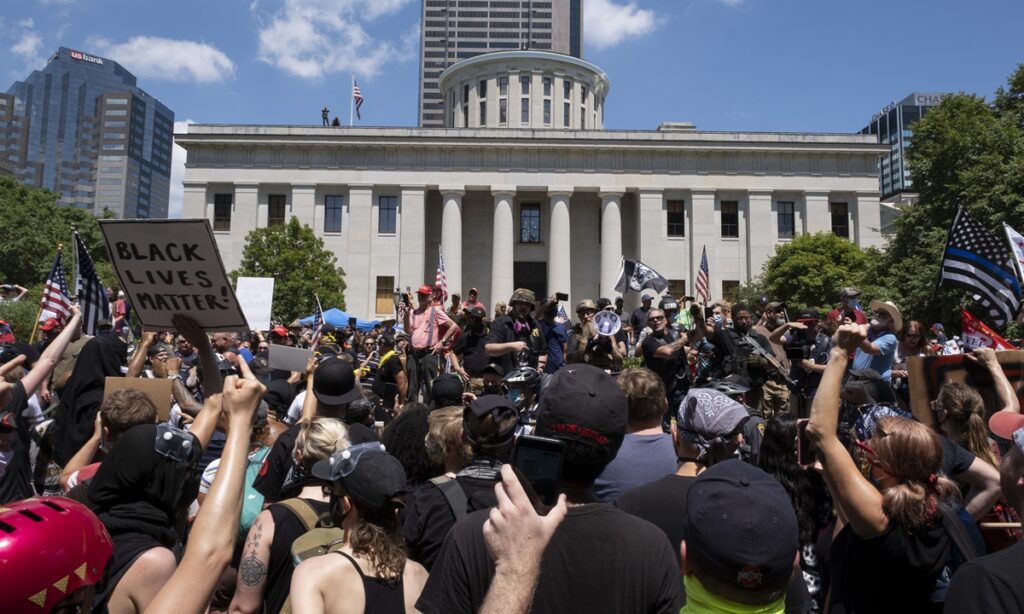Editor note:
As US Secretary of State Mike Pompeo’s attacks on China escalate, observers noted that some US politicians are joining him to push China-US ties to the brink of a clear r upture. Anti-China US hawks are not only infamous in China, but also despised by many US progressives, according to observers.
China’s Foreign Ministry on July 13 announced sanctions against US Congressional-Executive Commission on China, Ambassador at Large for International Religious Freedom Samuel Brownback, US Senators Marco Rubio, Ted Cruz and US Representative Chris Smith, following US sanctions on Chinese officials over the Xinjiang issue.
The targeted individuals and groups are seen as the clowns of US politics for their far-right views on domestic affairs and meddling in international issues, said US observers.
“Regardless of the fundamental interests of the US people, these representatives and senators are poisoning the relationship of China and the US,” Gao Zhikai, Chair Professor of Soochow University and Vice President of Center for China and Globalization, told the Global Times.
Gao noted that China has always adopted a moderate foreign policy, advocating seeking common ground while shelving differences. Sanctions are not China’s usual practice. However, these anti-China forces in the US fabricate lies and confuse right and wrong. China has no choice but to take counter-sanctions.
Anti-China veterans
US Senators Marco Rubio and Ted Cruz are typical backers of the recent anti-China campaign led by the US.
Rubio has been involved in a wide range of China-bashing activities including the campaign to block the Chinese tech giant Huawei, promoting the Hong Kong Human Rights and Democracy Act of 2019, opposing US companies’ investment in China and demanding compensation from China over COVID-19.
Ted Cruz became one of the most prominent disruptive elements for his blatant foreign intervention in Hong Kong affairs. He gained an infamous reputation when he arrived in Hong Kong in October 2019, wearing a black shirt to mark his solidarity with Hong Kong rioters and support for the radical demonstrations that severely disrupted life in the city for months.
Many Chinese tagged Cruz as anti-Chinese and anti-Communist. He pushed for the bill to blacklist enterprises in Southwest China’s Xinjiang Uygur Autonomous Region over false allegations of suppression of the Uygur minority.
On April 14, Cruz announced his intention to introduce the “Ending Chinese Medical Censorship and Cover Ups Act of 2020,” legislation to sanction Chinese officials involved in the “ongoing suppression of medical experts, journalists, and political dissidents, amid Chinese censorship of its citizens that is helping to fuel the global pandemic of the coronavirus.”
“Cruz and Rubio are highly unpopular even in the US. Both of them are despised by most young people, working class people and minorities for their right-wing ideology,” Jack Campbell, a US observer focusing on China-US relations, told the Global Times.
“The senators are against universal healthcare, prison reform, public education, women’s access to abortion, and LGBTQ rights while they support tax cuts for the rich and foreign wars in the Middle East and Latin America. This is why they are disliked by the left. Even some conservative Americans perceive them as being opportunists who care about their own political careers and uphold failed economic policies,” said Campbell.
“Citizens in the US were more bothered by Ted Cruz not wearing a mask on an American Airlines flight last week. He lacks credibility with so many,” Dede Nickerson, producer and adviser of Huanxi Media Group Ltd in the US, told the Global Times.
Many of the politicians sanctioned by the Chinese government are those “who happen to be ‘blind’ Trump supporters and have put American people and democracy at risk with their self-interest; they have no business attacking China, it’s in nobody’s interest,” she said.
Congressman Chris Smith of New Jersey, another veteran anti-China hawk, proposed a bill in April calling for stripping China of its sovereign immunity and allowing US people to sue the Chinese government, according to his official website. Other Republicans such as Jim Banks joined the blame game in condemning the Chinese government’s handling of the novel coronavirus epidemic.
Earlier in March 2019, Smith introduced legislation to tackle China’s political influence in the US by saying “Beijing’s influence operations are sophisticated and threatening.”
Smith campaigns as a “moderate Republican” but in fact he’s “similarly very extreme, having supported US hegemony as part of the UN delegation during the Obama administration,” noted Campbell.
Sinophobia base camp
The Congressional-Executive Commission on China (CECC) was established by US Congress in October 2000 with the legislative mandate to “monitor human rights and the development of the rule of law in China,” and to submit an annual report to the US President and Congress.
The Commission consists of nine senators, nine members of the House of Representatives, and five senior administration officials appointed by the US president.
The CECC, staked with many anti-China senators has issued many reports with weak and even fake evidence criticizing China on issues involving Xinjiang and other religious topics. It invited Rebiya Kadeer, a separatist from Xinjiang who now resides in the US, to a hearing in 2018.
CECC’s seemingly research-based reports attempt to make anti-China lawmakers’ attacks on China appear to be scientific, which is what they lack most, Gao, the professor, told the Global Times.
They have made groundless accusations against China based in extreme ideology without comprehensive understanding of China, Gao said, adding that the US people are also victims of their lies.
CECC’s reports are filled with negative anti-China information that influences other members of the Congress, Liu Weidong, a research fellow at the Chinese Academy of Social Sciences’ Institute of American Studies, told the Global Times on Thursday.
Liu noted that these lawmakers are not scholars and have no rational consideration for China. They are not considering the national interest, but take the occasion to play for their own political interests.
Global meddler
Samuel Dale Brownback, a former US Republican Senator from Kansas, is now the US Ambassador at Large for International Religious Freedom (IRF), which was formed after the adoption of International Religious Freedom Act (IRFA) of 1998 and allows the US to meddle in the affairs of other countries in the name of religion.
The ambassador is designated by the US president directly and serves as an advisor for him on religious issues.
Brownback and the IRF office have smeared China on issues related to Xinjiang or Tibet since he was appointed by Donald Trump in 2018. Apart from distorting the facts, the IRF has meddled in other countries through tools such as its annual Report on International Religious Freedom.
For instance, the 2020 report listed countries such as Myanmar, China, Iran and Russia as “Countries of Particular Concern,” and put countries such as Cuba and Uzbekistan on a “Special Watch List.”
“This report has made bogus and baseless claims about our country,” Iranian Foreign Ministry Spokesman Seyyed Abbas Mousavi said on April 30, refuting the US annual report on international religious freedom. “The US government has once again repeated the baseless and undocumented allegations…” he said.
According to the Christianity Today, under the 2016 IRFA amendment, mandatory IRF training is provided to all Foreign Service officers – which today number 8,000 – before deployment overseas. “Religious freedom for all people worldwide is a foreign policy priority,” read the executive order Trump signed on June 2.
Brownback has used religion to legitimize a number of other far-right positions, said Campbell.
Protertors confront anti-mask groups in front of the Ohio Statehouse during a right-wing protest “Stand For America Against Terrorists and Tyrants” at the State Capitol on Saturday in Columbus, Ohio. Photos: AFP



